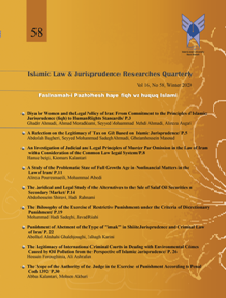A Study of the Problematic State of Full Growth Age in Nonfinancial Matters in the Law of Iran
Subject Areas : Private lawAlireza Poursmaeli 1 , Mohammad Abedi 2
1 - Teacher
2 - Teacher
Keywords: puberty, Full growth age, Insanity, Presumption of Growth, Nonfinancial matters,
Abstract :
After the Islamic Revolution in Iran, article 1210 of the Civil Code was amended and full and growth age, set at 18, was replaced by puberty age of 9 for girls and 15 for boys in lunar years of Islamic calendar. This amendment has resulted in conflict between regulations. The Supreme Court has attempted to solve this conflict and in its decision No. 30-23/12/1985, along with puberty, has required the confirmation of full growth age in financial matters. While in nonfinancial matters, puberty age alone has been considered sufficient, and girls or boys who reach the age of puberty, 9 and 15 respectively, can decide for themselves independently in nonfinancial matters such as their education and the change of their family names. This claim, due to its negative effects and consequences, must be restricted. Additionally, different ages have been referred to in civil law and attempts must be made to overcome such controversies. This paper attempts to introduce one single age as growth age in nonfinancial matters and seeks to harmonize the probable conflicts between regulations based on the benefits of the society and the individuals. It is concluded that, based on the single-clause article concerning growth age of the parties to a contract, 18 must also be considered as the presumption of growth in nonfinancial matters.
34. نراقى، مولى احمد بن محمد مهدى، (1417)، عوائد الأیام فی بیان قواعد الأحکام، انتشارات دفتر تبلیغات اسلامى حوزه علمیه قم، قم.
_||_Al-Jaṣṣās, A. (1984). Aḥkām al-Qur'ān. Beirut: Dār al-Iḥyā’ al-Turāth.
Al-Kasani, A. (1986). Bada'i' al-Sana'i' fi Tartib al-Shara'i'. no place: Dar al-kotob al-Iimiyah.
Al-Sarakhsi, M. (1993). Al-Mabsut. Beirut, Lebanon: Dar al Marefah.
Ansari, M. (1995). Ketab al-Nekah. Qom: World congress in commemoration of Sheikh Ansari.
Faiz Kashani, M. (no date). Mafatiḥ al-saraʾe. Qom: Ayatollah Marashi Najafi Library.
Fakhr al-Dīn al-Rāzī, A. (no date).Tafsir al-Kabir (also known as Mafatih al-Ghayb). Beirut, Lebanon: Dār al-Iḥyā’ al-Turāth al-Arabi.
Ghiasi, J., & Heidari, M. (2017). Evaluating juvenile penal code in Islamic jurisprudence in Iran. Islamic Law & Jurisprudence Researches, 9(32), 87-104.
Hor Ameli, M. (1989). Vasael al-Shia. Qom: Aal al-Bayt Institute.
Husseini Rohani, S.M.S. (2013). Menhaj al Salehin. Beirut, Lebanon: Dar Belal lel Tabaah va al Nashr.
Ibn 'Abidin, M.A. (1992).Radd al-Muhtār 'ala al-Durr al-Mukhtā. Beirut: Dar al fekr.
Ibn Nojaim, Z. (no date). Al-Bahar al- Ra`eq. no place: Dar al Kotob al Eslami.
Katuzian, N. (1997). General rules in contracts. Tehran: Enteshar Publishing Company.
Katuzian, N. (2000). Civil law in the current legal order. Tehran: Dadgostar Publishing.
Katuzian, N. (2009). General rules in contracts. Tehran: Enteshar Publishing Company.
Katuzian, N. (2014). Family law: marriage and divorce. Tehran: Enteshar Publishing Company
Kuwait Ministry of Awqaf and Islamic Affairs. (1983-2006). Encyclopedia of Islamic Jurisprudence (Mausua Fiqhiya Kuwaitiya). Kuwait: Dar al Salasel.
Makarem Shirazi, N. (2004). Anvar al feqahat. Qom: Imam Ali Ibn Abi Taleb School Publication.
Mirza Qommi, A. (1992). Jame' al-Shatat (M. Razavi, Ed.)Tehran: Keyhan.
Mohaghegh Najib, N. (no date). Al-Majallah al-Ahkam al-Adaliyyah. Karachi: Karkhneh Tejarat e Ketab, Aaram Baq.
Mojahed Tabatabei, S.M. (no date). Ketab al Manahel. Qom: Al al-Bayt Institute.
Motahari, M. (2007). Legal rights of women in Islam. Tehran: Sadra.
Muoghaddas Ardabili, A. (no date). Majma al-Faedeh val-Borhan fi Sharh al-Adhhan. Qom: Islamic Publication Dependent on Jameah Al-Modarresin of Qom.
Najafi, M.H. (1984). Jawaher al-Kalam. Beirut, Lebanon: Dār al-Iḥyā’ al-Turāth al-Arabi.
Naraqi, A. (1996). Awa'id al-ayyam fi bayan muhimmat al-ahkam. Qom: Daftar Tabliqat Eslami.
Parsapour, M. (2012). A Juridical reflection upon validity of full age for marriage in the marriage contract. Islamic Law, 8(29), 89-109.
Safai S.H., & Qasemzadeh, S.M. (2005). Civil law: persons and persons under legal incapacity. Tehran: Samt.
Sanei, Y. (2005). Justice esteftaat: civil law. Qom: Partov -e- Khorshid Publication.
Sarikhani, A., & Heidari, M. (2017). Legal and judicial study of testimonials by minors. Islamic Law & Jurisprudence Researches, 9(31), 83-102.
Shafti Gillani, S.M.B. (2008). Questions and answers in jurisprudence. Isfahan: Ḥawza ʿIlmīyya Isfahan computer research center.
Shahid Thani, Z. (1991). Al-Rawḍa al-bahīyya fī sharḥ al-lūmʿa al-dīmashqīyya. Qom: Davari.
Shahidi, M. (2009). The Formation of contracts and obligations. Tehran: Majd.
Shobairi Zanjani, S.M. (1998). Ketab al-Nekah. Qom: Rai Pardaz Publishing Institute.
Tabatabei Yazdi, S.M.K. (1998). Urwa al-Wuthqa. Qom: Islamic Publication Dependent on Jameah Al-Modarresin of Qom.
Zuhayli, W. (no date). Al-Fiqh al-Islami wa Adilataha. Damascus: Dar al feker


